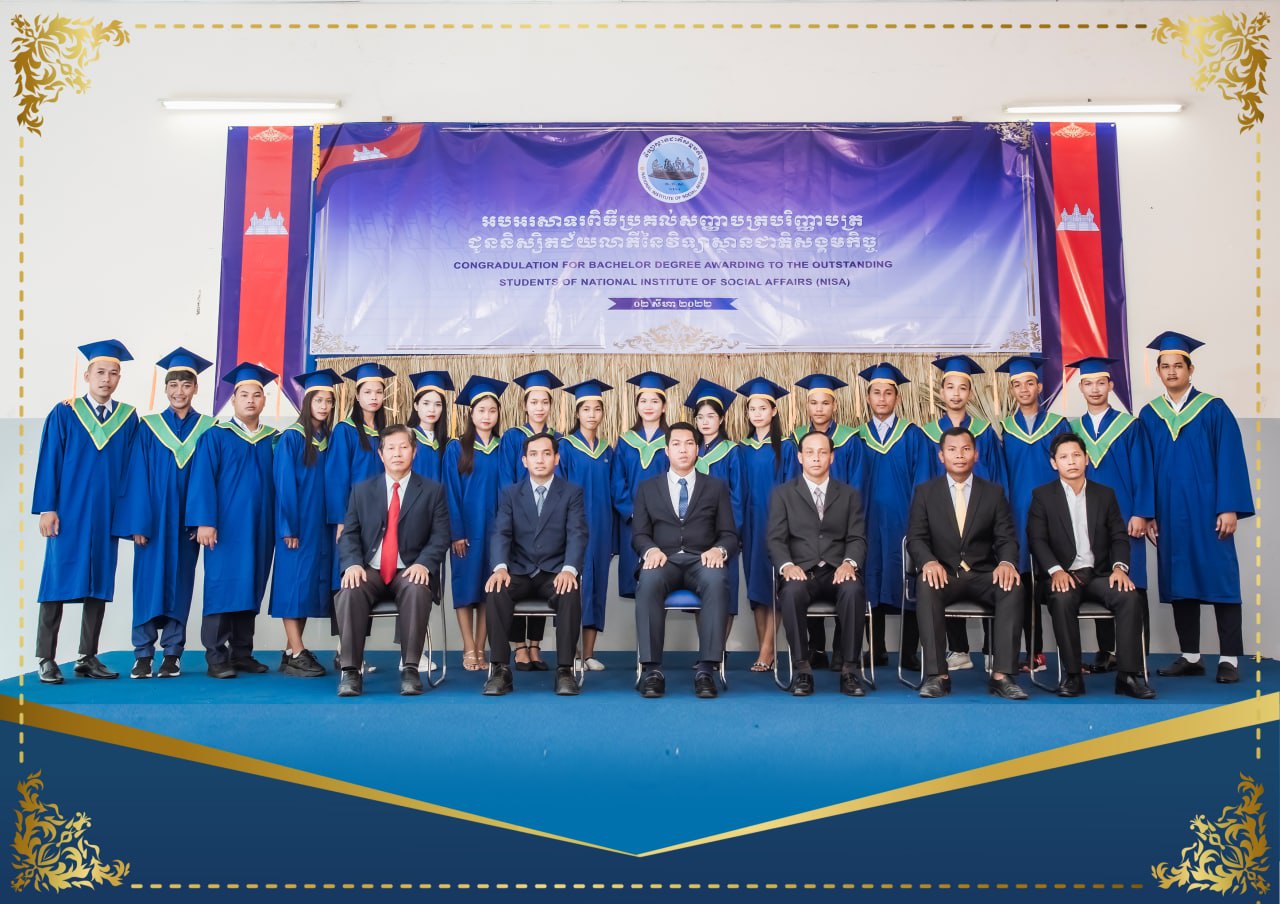Background
National Institute of Social Affairs (NISA) is a recognised institution under the Ministry of Social Affairs, Veterans, and Youth Rehabilitation in Cambodia, entrusted with the responsibility of delivering educational and research services in the domains of social affairs, social work, social protection, public administration, public policy, and social policy. Established in 2011, NISA has successfully graduated over 500 individuals who have gone on to contribute their expertise to government agencies, national and international non-governmental organisations (NGOs), and local communities. In addition to its academic programs, NISA offers comprehensive short-course training covering a diverse range of topics and skills related to social work, child protection, elderly care, handicap identification registration, and more. These training initiatives aim to enhance the knowledge and capabilities of individuals working in these fields and further equip social workers with skills and knowledge towards supporting the needs of victims and vulnerable and disadvantaged groups in Cambodia.
NISA has collaborated with various partners to conduct numerous research projects, with a specific focus on informing policymakers and generating positive impacts for vulnerable groups. By engaging in research and knowledge-sharing activities, NISA actively contributes to evidence-based policymaking and the advancement of social welfare initiatives. Through its multifaceted endeavours, NISA plays a vital role in fostering professional development, conducting impactful research, and promoting social well-being in Cambodia.
Please click here for more information about NISA.
Partnership with Ponlok Chomnes II
Under the Ponlok Chomnes Innovation Fund, with support from the Australian Department of Foreign Affairs and Trade, NISA is developing a research proposal titled “Climate Change Adaptation through a Cash-Transfer Program (CTP) in Cambodia: Empirical Experiences from Coastal Communities.” The research aims to examine the CTP’s relationship with climate change and the resilience of coastal communities. It will analyse climate change impacts on livelihoods, examine the interconnection between the program and climate resilience development, and provide recommendations for enhancing benefits for disadvantaged communities. The findings will help formulate strategies and policies to support and empower vulnerable communities in Cambodia.
The Cash Transfer Program (CTP) from the Royal Government of Cambodia has successfully supported vulnerable groups, particularly during times of crisis such as the COVID-19 pandemic. The program provides monthly cash support to those with an ID Poor Card, representing the poorest and the poor segments of the population based on eligibility criteria.
While Cambodia is recognized as a vulnerable country to climate change with limited capacity for adaptation, it is fortunate that struggling households receive some level of support from the government to reduce their adaptation costs and improve their overall conditions. However, it is worth noting that the current evaluation process for the Poor I and Poor II categories does not adequately reflect climate-related criteria. As a result, many communities, particularly those located in climate-affected areas such as the coastal regions of Cambodia, are not fully entitled to the benefits of the CTP. To address this issue, it is crucial to conduct further research to determine whether the CTP effectively builds resiliency to climate impacts. NISA is thus conducting a study that aims to assess the program’s impact on enhancing adaptive capacity and recommends the inclusion of climate-related criteria in the evaluation process in the future. By expanding the coverage of government assistance to encompass more climate vulnerable communities, the program can contribute significantly to their ability to adapt and thrive despite the challenges posed by climate change.
This is a joint-research project with Advocacy and Policy Institute (API) and Fisheries Action Coalition Team (FACT).
API is a Cambodian non-governmental organisation focused on advocacy, policy influencing, good governance, and civic engagement. With over two decades of experience, API has institutionalised advocacy skills and made local democratic and accountable governance a reality. API has conducted over 300 training courses for over 10,000 participants, including civil society, community-based organisations, local councils, media outlets, trade unions, government institutions, and the Cambodian Parliament. API is unique in Cambodia’s civil society for its role in empowering citizens and promoting human rights, serving all Cambodians, and valuing diversity.
Please click here for more information about API.
FACT is a coalition of NGOs established in 2000 to address fisheries and environmental issues around Tonle Sap Lake and coastal areas. It was part of the NGO Forum on Cambodia’s environment project and was formed by eight NGOs with support from international organisations. In 2004, FACT separated from the NGO Forum on Cambodia after the government released up to 56% of commercial fishing lots to community management. The organisation focuses on advocating for fisheries issues and monitoring policy reforms, mobilizing provincial NGOs and Community Based Organisations to respond to development policies. FACT’s work focuses on issues affecting Cambodian communities’ livelihoods.
Please click here for more information about FACT.
Publication by NISA, API, and FACT under Ponlok Chomnes II

